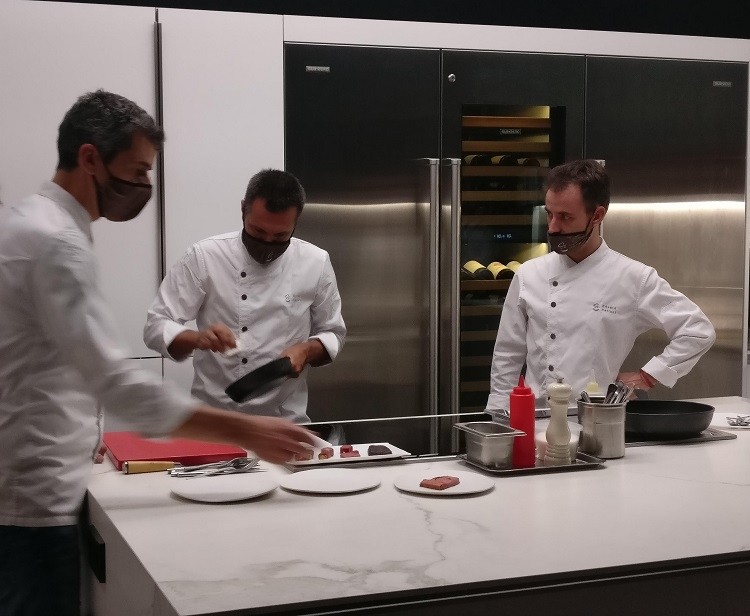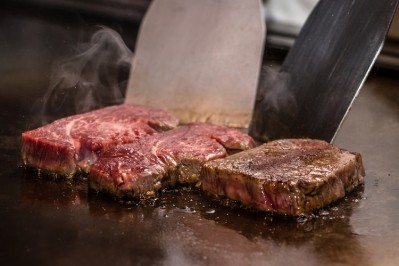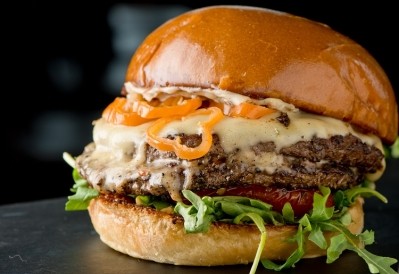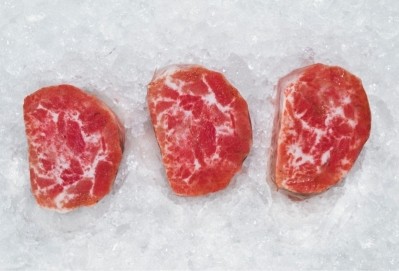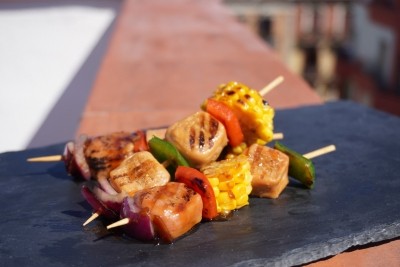‘World’s biggest’ piece of cell-based whole cut analogue developed: ‘Meatballs, burgers and nuggets have already been done’
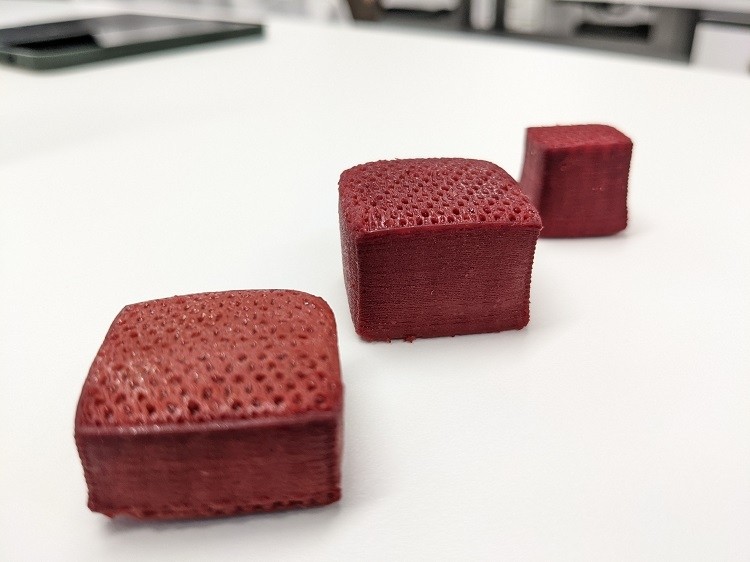
While the coronavirus pandemic brought many food players to a halt, Barcelona-headquartered Novameat appears to be as busy as ever.
The plant-based meat developer, which uses patented microextrusion technology to achieve a meaty texture from plant proteins, has kickstarted a collaboration with Michelin-starred restaurant Disfrutar, secured a €250,000 investment from the Spanish Government, and claims to have made the biggest cell-based meat prototype on the planet.
At the heart of Novameat’s invention is a desire to move away from processed meat alternatives, according to founder and CEO Giuseppe Scionti.
“I am really looking forward to the next few months, because if our technology is able to unlock the whole cut market, this can be a complete gamechanger for the alternative meat industry,” he told FoodNavigator.
Biggest on the block?
Prior to founding Novameat, Scionti was working in bioengineering at the University of Catalunya. It was during this time that he discovered a way to ‘bio-hack’ the structure of plant-based proteins.
Bringing this expertise to Novameat, Scionti’s technology ‘finely tunes’ protein structure at the microscopic level to create a ‘meaty’ texture.
He has since managed to create whole cuts of meat analogues using pea protein, rice protein, algae fibres and vegetable oils. According to the founder, his whole beef muscle cut prototype, for example, matches the colour of the real thing, while the external and internal structures mimic the fibre structure of beef.
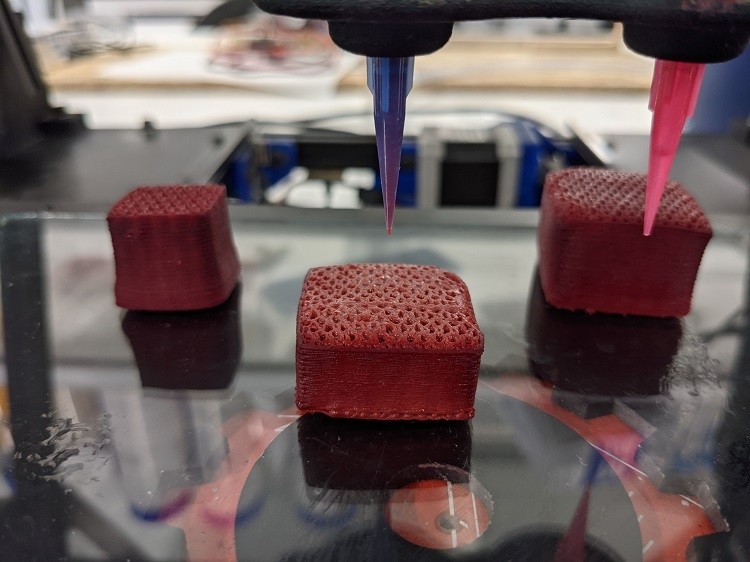
Now, Novameat is celebrating a new feat: the development of the ‘world’s biggest’ piece of cell-based whole cut analogue. “Our biggest cell-based meat prototypes – or you can call them hybrid meat analogues, as we mix mammalian adipose cells with a biocompatible plant-based scaffold – score at 22500mm³ in volume,” Scionti explained.
This volume is greater than Korean genetic research firm Eone Diagnomics Genome Center’s (EDGC) efforts, Novameat’s CEO elaborated. In December, EDGC published research on what was considered the largest scaffold able to sustain cultivated meat applications.
“I calculated their volume at 17000mm³,” said Scionti, which is 5500mm³ smaller than Novameat’s volume.
Novameat bets on hybrid whole cut analogues
So why is creating thick whole cut meat alternatives important? The Novameat founder says the alternative meat industry is ‘urgently’ looking to move beyond processed meat analogues and high-moisture extrusion products such as chicken strips and tuna chunks.
“Meatballs, burgers, nuggets and thin slices of whole cuts have already been done. But if I were going to a high-end restaurant – where I expect cell-based meats to be sold in the next few years – to try cell-based meat, I would prefer to try a thick cell-based Kobe Wagyu beef or an expensive seafood. And I don’t see much advances in that sense yet.”
Novameat is not a pureplay cell-based meat company, nor are its prototypes 100% plant-based. Rather, it is working on a hybrid approach to help solve ‘technological limitations’ facing the lab-grown meat space.
“If we really want to see cell-based meat competing on price with conventional meat, there are a few technological limitations that need to be solved,” explained Scionti.
These include: “finding solutions to replace animal-based cell media and foetal bovine serum [BVS] the feeds the cells, new bioreactors to grow trillions of cells – there could be around 100trn cells in a single cow’s body – without antibiotics, standardising and synthetizing the target molecules – proteins and fatty acids, mostly – and tri-dimensional biomimetic and microporous scaffolds to enhance cell proliferation, migration and differentiation.”
Given Scionti’s background in tissue engineering, Novameat is tackling this with a hybrid approach.
“We decided to start by adding only the right amount of cells to achieve the functionality that we require from animal cells,” the founder explained. “In our case, the scaffold provides the texture, appearance and part of the nutritional properties, while the adipose cells provide the taste functionality of an animal-based fat.
“My bet is that hybrid cell-/plant-/fermentation-based meat products are going to represent a bigger part of the future of alternative products than a 100% cell-based meat analogue – at least in the next decade – because of the very high price and complexity to achieve the latter.”
Reaching for the stars
Novameat’s commercialisation strategy includes both retail and foodservice. To progress in foodservice, the start-up has initiated a collaboration with two-Michelin-starred restaurant Disfruitar.
Run by the culinary team from the celebrated restaurant El Bulli, the Barcelona-based restaurant now has full access to Novameat’s micro-extrusion technology.
“The Disfrutar Creativity Lab already has Novameat’s first 3D printer located outside Novameat’s Innovation Lab,” Scionti revealed. “The restaurant has started working with our 3D printer to evaluate the potential of the technology.”
The objective is for Novameat’s plant-based product to appear on Disfrutar’s menu by the end of the year. “This is the first step in this direction,” we were told.
“At Novameat, we are aiming to set the benchmark for the next generation of plant-based meats: with this collaboration, we aim to achieve something as good as a Wagyu Kobe meat, but as sustainable as a plant protein.”
“To reach a game-changing moment in the alternative meat sector, we cannot just create another fake meat, but we must aim to create the ‘Tesla Roadster’ of plant-based meats instead.
“If you want to achieve a plant-based meat product which has a sensorial experience superior to industrially-farmed meat in taste, texture and nutritional properties, you want to work together with the best of the best, and we are lucky that Barcelona – and Spain in general – host many of them.”
Investment to move beyond 3D printers
Funding is of course crucial to how quickly Novameat can bring its prototypes to market.
The start-up recently secured a €250,000 investment from the Spanish Government through its NEOTEC Programme, which is part of the Spanish Centre for Industrial Technological Development (CDTI), and expects to close an investment round in the coming months.
“We are going to raise an investment round very soon, which we expect to close in spring this year,” said Scionti.
“The investment will accelerate the launch of our technology in foodservice during 2021, and scale our technology beyond 3D printers to produce thousands of kilograms of plant-based whole-cuts of meat per hour with industrial machines, which we already demonstrated in a proof of concept with very exciting results.”
Concerning the launch of Novameat products into retail, the CEO said he is ‘evaluating the best industrial partners’ as we speak.
“2021 will be the most important year so far at Novameat: we’ll launch in restaurants, launch our scaffold as a service business model for the cell-based industry, and what I care most about, we’ll scale up with bigger machines to ensure we contribute to the future of planet’s health.”
